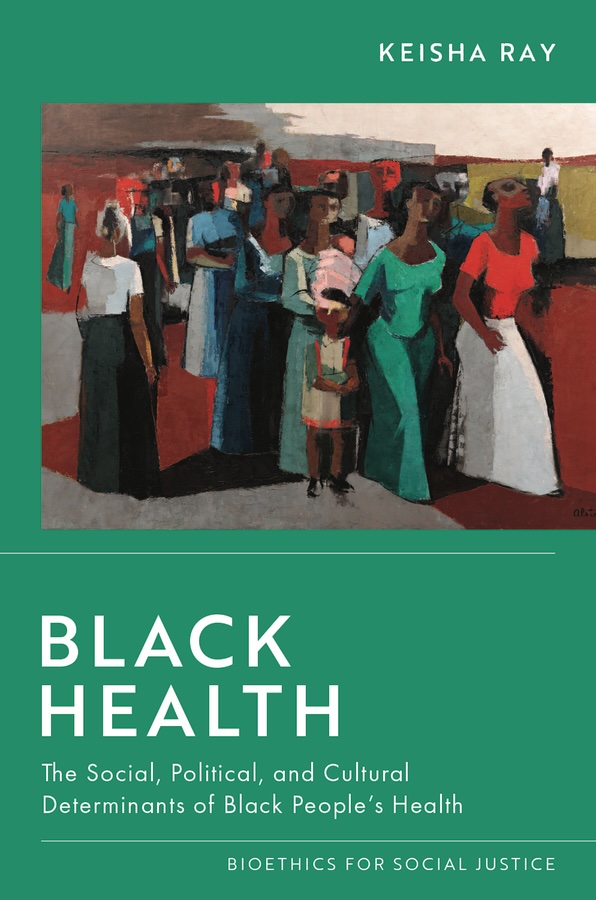
Keisha Ray’s 2023 monograph, Black Health, wants you to know that “’Black Health‘ is Black Bioethics.”
Black Health calls for bioethicists, academics, medical practitioners, and the general public to take Black people’s health seriously as a matter of justice rather than of biology or of a historical precedent too deeply ingrained to disrupt. It’s a call for a better, more just bioethics that concerns itself not only with measurable health disparities but with the psychic and financial costs of such disparities, particularly to Black patients and would-be patients.
Bioethics for the People
In the preface, Ray defines her goal of providing a Black health text that’s both rigorous enough for bioethicists to bring it into their classrooms and accessible enough to be of value to non-academics (namely, non-academic Black people themselves) interested in learning more about Black communities’ relationships with health care. In Black Health, she far exceeds this goal, providing a text that puts health disparities into ordinary language without oversimplification. She seamlessly weaves together bioethics and the often-overlooked realities that its theories are often meant to reflect.

Beyond the Past
Black Health is a text about the deep-seated structures that are often overlooked if we limit our focus to one or two major historical injustices. Ray, like Vanessa Gamble, doesn’t downplay the importance of landmark injustices like the Tuskegee Syphilis Study but cautions against using them as our go-to examples. Medical anti-Blackness is not limited to the past. Instead, she argues, the mundanity of anti-Blackness in medicine and bioethics means that we must recognize that a revitalized Black bioethics is, and will always remain, necessary.
Black Patienthood
I read Ray’s text as a testament to the experience of Black patienthood. Patienthood extends far beyond the clinical encounter itself. For instance, responding to literature that too often conflates the social determinants of health (helpfully defined on pages 13-14 and revisited throughout the text) with lifestyle choices, Ray notes that “lifestyle choices are [often] better understood as life’s circumstances.” This understanding avoids blaming Black people for population-level poor health outcomes and simultaneously dispels the idea that White people are somehow morally praiseworthy for their (our) own better health. Health outcomes aren’t a matter of making, but of having, or being in the circumstances to make, ‘good’ choices. According to this view, then, the experience of patienthood – or what that experience will look like for any hypothetical patient – is partially determined before any actual medical encounter.
Black Pain
Ray’s account also offers a more complete account of patienthood with respect to pain. Each chapter of Black Health is titled with a question, with the second being “Who Believes Our Pain?”. The question of pain and belief in medicine isn’t a totally novel one, but it’s typically addressed through an epistemic injustice framework which (inadvertently) often ends with the idea that someone’s – or, more collectively, some group’s – pain being ignored is an injustice because it’s based on discriminatory attitudes and prolongs pain, and pain is something we want to avoid. Ray talks about this injustice in more material terms, drawing attention to the myriad costs of pain. These include financial costs (e.g., the co-pays, out-of-pocket costs, and lost income resulting from multiple medical appointments) as well as increased mortality from suicide. None of this is to say that the duration of pain doesn’t matter, or that decreasing Black patients’ pain isn’t good in itself; Ray makes it clear that delays in treatment can even be deadly. Instead, I take her to be arguing that the lack of timely medical care that Black people often face carries surreptitious costs – both psychic and material – that aren’t captured solely by physical pain duration.
The Hidden Curriculum for Black Patients
In addition to detailing the hidden costs of health disparities, Ray discusses some of the hidden curricula of navigating medicine. In cardiac care, racial biases mean Black people seem more susceptible to cardiovascular disease than Whites yet (perhaps paradoxically) tend to receive less sufficient care. Ray amplifies the story of a Black man who presented with cardiac symptoms but wasn’t taken seriously by emergency room physicians. The man’s daughter, herself a physician, instructed him to lie about his symptoms to “work around the health care system to get admitted to the hospital.” He had to say the “right things” to receive the correct treatment. Ray highlights the many hidden expectations for Black patients – namely, that they perform their symptoms in a way that’s palatable and recognizable to the (White-centered) medical establishment. Barring an adequate performance, Black patients are more likely to be denied care, even for critical events like this man’s heart attack.
This points to a sort of elite capture problem, because those who are able to perform the patient role well are likely to be those who are already in closer proximity to the medical establishment (and the privileges it confers). The point remains that Black patients shouldn’t need to have family members coaching them through medical encounters in order to receive timely, adequate care.
Black Health is a call for bioethics to concern itself with histories and futures alike. Ray strikes a balance between a realistic telling of history – a history that’s laden with blatant racism, at that – and a call for hope. If the field reckons with the widespread anti-Blackness that pervades it, a better bioethics is possible.
Erica Bigelow is a graduate student in Philosophy at the University of Washington.